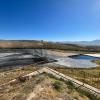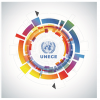News
Displaying Results 1 - 25 of 30
UNECE and partners are working together to support North Macedonia in its green energy transition by building capacities to finance energy efficiency (EE) and renewable energy (RE) projects.
To this end, UNECE and UNDP organized two training sessions on design and verification of energy…
As countries seek to rapidly decarbonize their economies, investing in energy efficiency and the improved performance of buildings offers significant near term gains. Available measures can help transform the building and construction sector, which today is responsible for approximately 40% of…
In the UNECE region, the Fourth Cycle of Environmental Performance Reviews (EPR) kicks off with the review of Tajikistan, carried out for the fourth time under the leadership of UNECE.
A large, multidisciplinary team of international experts worked in Dushanbe from 6 to 15 November 2023,…
UNECE and partners have started implementation of a multi-year project on “Improving the energy efficiency of the global building supply chain industry and its products to deliver high performance buildings” (full project budget EUR 19.8 million), funded by the International Climate Initiative (IKI…
For some time now, Uzbekistan has been engaged in various activities under the UNECE Convention on Access to Information, Public Participation in Decision-making and Access to Justice in Environmental Matters (Aarhus Convention).
An international round table entitled “Aarhus Convention: Effective…
Mining is an important sector and economic contributor in Central Asian countries due to their rich mineral base. However, the mining activities also generate huge amount of waste which can contain hazardous substances and must be safely stored in so-called tailings management facilities (TMFs).…
Uzbekistan is one of the world's largest producers of gold and uranium. In the last 40 years, Uzbekistan has built a strong mining industry, which is expected to grow in the years to come, given that only 20 % of the country’s territory has yet been explored. The expected rise in the number and…
While Uzbekistan has improved its environmental performance in line with the Sustainable Development Goals (SDGs) related to water and sanitation (SDG 6) and forests and tree cover loss (SDG targets 15.1, 15.2, 15.3), significant challenges remain related to air quality (SDG 11.6), water resources…
UNECE is leading a large and diverse group of international experts carrying out the 55th Environmental Performance Review (EPR) since the establishment of the UNECE EPR Programme, 25 years ago. Azerbaijan has requested UNECE to review its environmental performance for a third time. To provide the…
Transitioning towards a knowledge-based economy away from a resource-intensive model of economic growth is central for sustainable development among the seven countries of the UN Special Programme for the Economies of Central Asia (SPECA) - Afghanistan, Azerbaijan, Kazakhstan, Kyrgyzstan,…
A coordinated response is necessary for promoting and implementing the circular economy agenda globally. Concrete commitments from governments, businesses, international organizations, civil society and other stakeholders will be key to building the sustainable, resilient and low-carbon economy…
UNECE is deepening its support to help countries of the region capitalize on innovation to recover from the pandemic and realize the ambitious vision of the 2030 Agenda.
The UNECE Innovation for Sustainable Development Review (I4SDR) of Uzbekistan, which is currently underway, will set out…
Countries of Central Asia, the Caucasus and Eastern Europe have been hit hard by the socioeconomic impacts of the COVID-19 pandemic, which threatens to derail sustainable development progress in the region.
However, there is also a stronger momentum towards regional cooperation, and countries can…
By Ms. Olga Algayerova, UN Under-Secretary-General and Executive Secretary of UNECE, and Ms. Elisabete Quintas da Silva, Head of Department, Sustainable and Efficient Use of Resources Operational Programme, Government of Portugal, and Chair of the UNECE Committee on Environmental Policy.
This…
At the informal virtual policy dialogue on fashion in Moldova hosted by the United Nations Economic Commission for Europe (UNECE) on 19 May 2021, members of the UN Alliance for Sustainable Fashion and stakeholders of the Moldovan fashion industry came together to discuss the potential of this…
The extraction of raw materials worldwide has more than doubled since 1990 and could double again by 2060 in the absence of corrective policies. According to the UN International Resources Panel, resource extraction and processing account for 90% of global biodiversity loss and water stress impacts…
UNECE continues to help its member States to respond to COVID-19 crisis. As part of this work, Guidelines and Best Practices for Micro-, Small and Medium Enterprises in Delivering Energy-Efficient Products and in Providing Renewable Energy Equipment developed earlier are being customized for North…
The Government of Ukraine is currently implementing a broad policy agenda aimed at achieving the Sustainable Development Goals (SDGs) and pursuing a resilient, inclusive and sustainable post-COVID recovery. UNECE, together with UNDP, UNICEF and WHO, is supporting these efforts through a Joint…
The 56 countries of the UNECE region, spanning from North America to Europe, the Balkans, the Caucasus and Central Asia, are major users and producers of natural resources. Efficiency in the domestic use of resources continues to increase in the region, but the overall material footprint, which…
Systemic deficiencies with regard to access to information, decision-making or compliance with environmental law can seriously threaten successful implementation of circular and green economy and sustainable development. Taking a case to court to advance a widely shared public interest remains an…
With the COVID-19 pandemic, Trade facilitation has acquired even greater importance for the land-locked countries of Central Asia, as it helps remove burdensome formalities for their trade and transport operations. Simplifying and digitalizing procedures helps diminish physical contacts along…
The COVID-19 pandemic has had a dramatic impact on cities and the wellbeing of communities. Cities and urban areas are at the frontline in the fight against the COVID-19 public health crisis and its socio-economic consequences. They also hold significant potential for recovering better by adopting…
Uzbekistan has shown remarkable growth in its transition from a centrally planned to a market based economy, with annual growth rates between 5 and 9 per cent since 2004. Innovation, namely fostering experimentation and collaboration between innovation stakeholders to find new ways for creating…
A circular economy is a paradigm which can contribute to reducing the economic, environmental and social costs of resource use, while at the same time strengthening economic competitiveness, reducing poverty, and providing better quality of life, in line with the United Nations 2030 Agenda for…
As globalization increases the diversity of innovative ways of doing business around the world, economies become ever more interdependent. Multinational enterprise groups, or MNEs, have operations in several countries, so counting up their economic impacts entails looking across borders to gather…

























